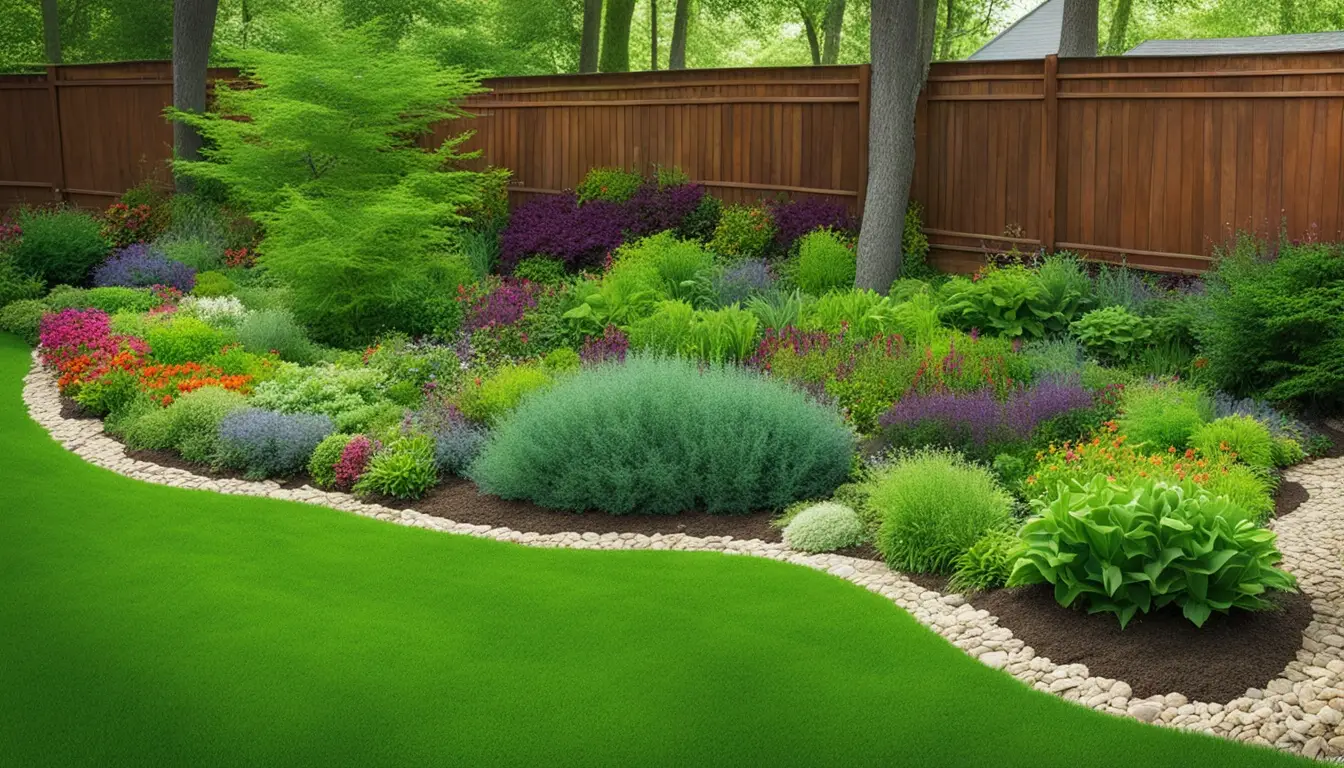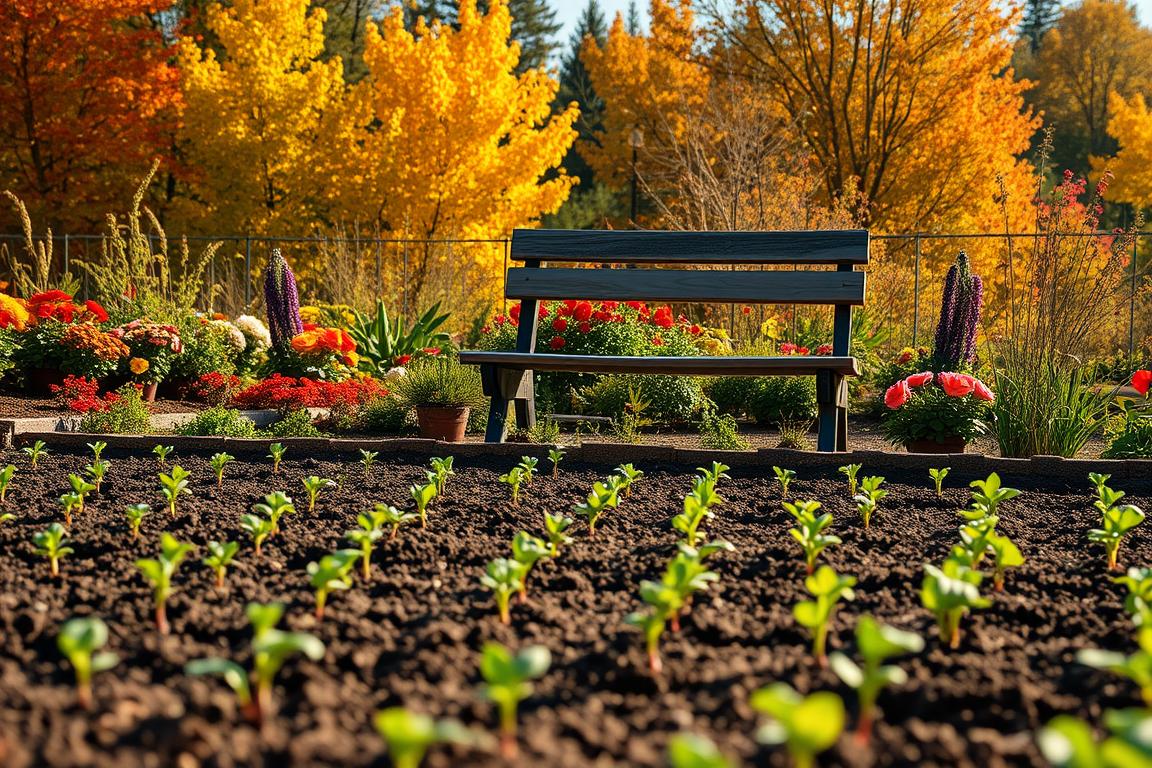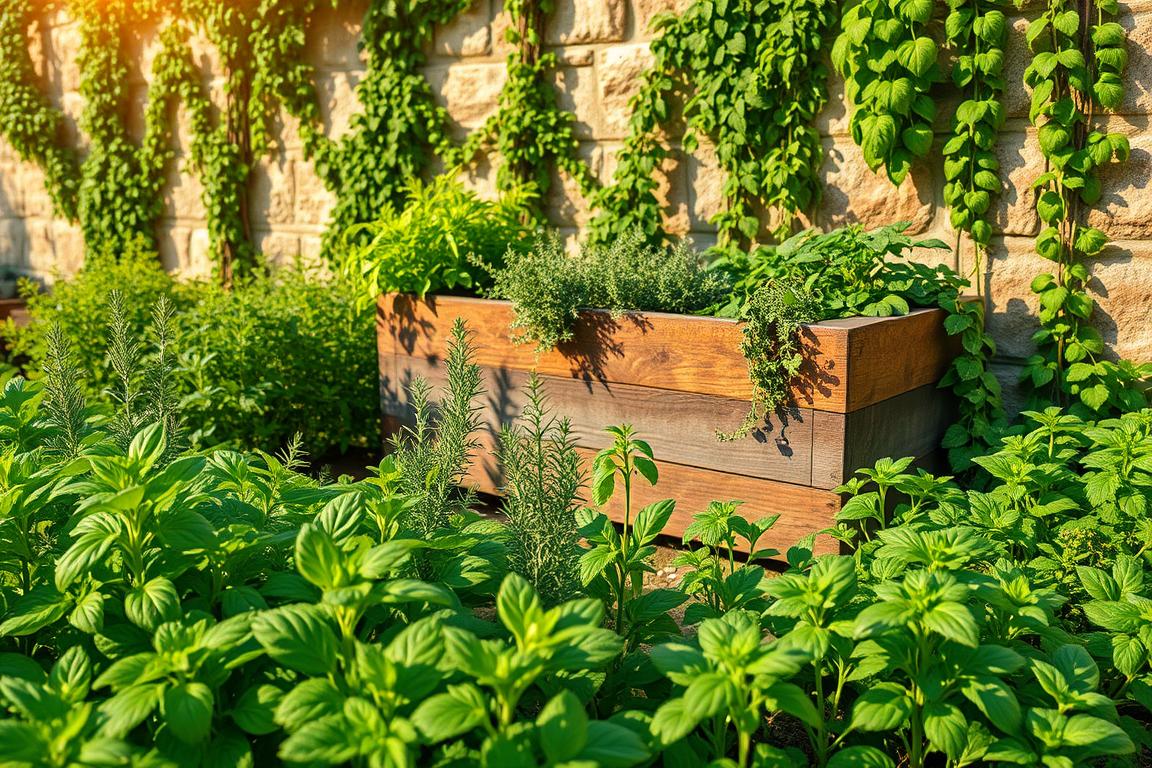Did you know a single dandelion can produce up to 15,000 seeds? This fact shows how tough weeds can be and the constant fight gardeners have to keep their gardens weed-free. But, there’s hope. Certain plants can naturally stop weeds, making your garden eco-friendly and easy to care for.
By planting these 7 plants, you can have a beautiful garden with fewer weeds. These plants work as ground covers and living mulches. They also help other plants grow better. This makes your garden look great and fights weeds in a green way.
Key Takeaways
- Weeds can be a big problem in gardens, taking over and competing with plants we like.
- Some plants can stop weeds from growing by covering the ground and making it hard for weeds to survive.
- Adding these plants to your garden can cut down on weeds in a way that’s good for the planet.
- The 7 plants we talk about can help you manage weeds in a lasting way.
- Using these plants means you can have a garden that’s full of life and easy to take care of.
The Struggle with Weeds
Gardeners often face a tough fight against weeds. These unwanted plants can quickly take over our gardens. They compete for nutrients, water, and sunlight, hurting the growth of our flowers, vegetables, and herbs.
Weeds: A Gardener's Nemesis
Weeds are a big problem for gardeners. They spread fast and can outgrow our plants. These invaders reproduce quickly, making it hard to keep our gardens looking good.
The Importance of Weed Prevention
Stopping weeds from taking over is key to a healthy garden. Using natural weed prevention and organic weed management saves us time and helps our plants grow. By focusing on weed prevention, we can enjoy our gardens more and have a beautiful, thriving space.
Creeping Phlox: A Vibrant Ground Cover
Looking for a ground cover that’s both beautiful and fights weeds? Creeping phlox (Phlox stolonifera) is your answer. This perennial grows thick and spreads out, forming a weed-blocking mat. It comes in colors like pink, purple, and white, adding life to your garden.
Creeping phlox thrives in USDA Hardiness Zones 3 to 10. It’s easy to care for, perfect for those who want to prevent weeds without much work. It’s a top pick for anyone looking for a weed-suppressing, low-maintenance ground cover.
| Characteristic | Creeping Phlox |
|---|---|
| Growth Habit | Dense, mat-like |
| Flower Colors | Pink, purple, white |
| Hardiness Zones | 3 to 10 |
| Maintenance Level | Low |
Creeping phlox brightens your garden with its flowers and keeps weeds away. It’s a ground cover plant that makes your garden look lush and weed-free. Plus, it’s easy to care for, ideal for low-maintenance gardening.
“Creeping phlox is a fantastic ground cover that not only adds beauty to your garden but also helps keep those pesky weeds at bay.”
Sweet Woodruff: A Fragrant Weed Suppressor
If you want a ground cover that stops weeds and smells great, sweet woodruff (Galium odoratum) is perfect. This low-growing plant is great for an eco-friendly, weed-free garden.
Sweet woodruff grows well in USDA Hardiness Zones 4 to 8. It likes partial to full shade and moist, well-draining soil. Its dense growth stops weeds from growing by blocking sunlight.
This plant is also known for its sweet-smelling white flowers. The scent is like freshly cut hay and vanilla, making your garden more inviting.
Here are some reasons to use sweet woodruff in your garden:
- It stops weeds from growing with its dense growth.
- It has white flowers that smell nice.
- It grows well in partial to full shade.
- It looks like a natural mulch in your garden.
Sweet woodruff is great for a weed-free garden or adding fragrance to your outdoor space. It’s a top choice for eco-friendly gardeners.
7 Plants That Prevent Weeds in Your Garden
Are you tired of fighting weeds in your garden? Using the right plants can be a natural way to stop weeds. These 7 plants make your garden look great and keep weeds away. This means you can have a beautiful, easy-to-care-for garden.
By using companion planting and ground cover plants, you can make a garden that needs little weed control. Plants like creeping phlox and sweet woodruff grow fast and spread out. They take over the space, leaving no room for weeds to grow.
Try natural weed control and low-maintenance gardening with these seven plants:
- Creeping Phlox
- Sweet Woodruff
- Mint
- Lamb’s Ear
- Hosta
- Bugleweed
- Sedum
Adding these ground cover plants and eco-friendly landscaping ideas will make your garden weed-free and easy to care for. Enjoy the beauty and benefits of these plants in your low-maintenance outdoor space.
| Plant | Key Weed-Preventing Characteristics |
|---|---|
| Creeping Phlox | Dense, mat-forming growth that smothers weeds |
| Sweet Woodruff | Fragrant, spreading groundcover that outcompetes weeds |
| Mint | Aggressive, stoloniferous growth creates a dense barrier |
| Lamb’s Ear | Soft, velvety leaves and dense foliage inhibit weed growth |
| Hosta | Broad, shading leaves prevent sunlight from reaching weeds |
| Bugleweed | Rapidly spreading, mat-forming habit suppresses weeds |
| Sedum | Succulent leaves and stems outcompete weeds for moisture and nutrients |

Use companion planting and ground cover plants for a weed-free garden with less work. These seven plants are great for a low-maintenance and eco-friendly garden.
Mint: A Versatile and Invasive Weed Barrier
Mint (Mentha) is a top choice for gardeners. It’s tough, grows fast, and keeps pests away. This herb not only freshens up your garden but also fights weeds naturally.
The Benefits of Mint
Mint spreads out and covers the ground well. This stops weeds from growing by blocking sunlight. Plus, its strong smell keeps pests away, making your garden healthier.
Controlling Mint's Aggressive Growth
Mint grows too fast and can take over your garden. To keep it in check, grow it in a container or a special area. This stops it from spreading too much and keeps your garden balanced.
Adding mint to your garden helps with weeds and pests. It also adds beauty and is easy to care for. This makes your garden a peaceful, green space.
Lamb's Ear: A Fuzzy Weed Fighter
Lamb’s ear (Stachys byzantina) is a top choice for fighting weeds in your garden. It has soft, velvety leaves that form a thick mat. This mat blocks sunlight, stopping weed seeds from growing.
Lamb’s ear is also very tough and can handle drought. It grows well in USDA Hardiness Zones 4 to 8. This makes it perfect for low-maintenance gardening in different climates. Its gray leaves and resistance to deer and rabbits make it a great weed-suppressing plant.
“Lamb’s ear is a fantastic ground cover plant that can work wonders in suppressing weeds in your garden. Its dense foliage creates a lush, weed-fighting barrier that requires minimal maintenance.”
If you want a drought-tolerant garden or a way to keep weeds down easily, lamb’s ear is a great pick. It’s a standout weed-suppressing plant that keeps your garden looking good with little work.
Hosta: A Shady Solution to Weed Problems
If you’re fighting weeds in shady spots, hosta plants could be your answer. Their wide leaves form dense clumps. This blocks sunlight, stopping weed seeds from growing.
Hostas fit in many gardens, from small to large spaces. They love the shade and are easy to care for. They grow well in USDA Hardiness Zones 3 to 8, perfect for shady gardens.
Hostas stop weeds from growing easily. Their thick leaves block sunlight, so weed seeds can’t start. This means less weeding for you, keeping your garden neat.
Hostas also add beauty with their varied leaves. You can find them in deep greens or vibrant patterns. They’re great for low-maintenance gardening and woodland gardens.
Looking for lush greenery in a shady spot or a weed solution? Hostas are a great pick. They’re versatile and reliable for a beautiful, easy garden.
Bugleweed: A Colorful and Invasive Weed Deterrent
Looking for a ground cover plant to keep weeds away? Bugleweed, also known as ajuga, is a great choice. It forms a dense mat that blocks sunlight and stops weed seeds from growing.
Choosing the Right Bugleweed Variety
Not all bugleweed types are the same. Some spread too fast and can take over your garden. It’s important to pick ones that grow slower and won’t spread too much. Look for ‘Burgundy Glow’ or ‘Chocolate Chip’ for a better balance.
Maintenance and Control
To keep bugleweed in check, trim its runners and stems regularly. This stops it from spreading too much. You can also use raised beds or barriers to keep it in place.
With the right bugleweed, you can enjoy its benefits and its beautiful purple flowers. This makes your garden more vibrant and interesting.

| Bugleweed Variety | Growth Habit | Flower Color | Invasive Potential |
|---|---|---|---|
| Burgundy Glow | Moderate | Purple | Low |
| Chocolate Chip | Compact | Blue | Low |
| Royal Candles | Aggressive | Violet | High |
Conclusion
Using weed-suppressing plants in your garden is a great way to keep your garden looking good with less work. The 7 plants mentioned in this article, like creeping phlox and sweet woodruff, can help fight weeds. They take over the space and make it hard for weeds to grow.
By placing these plants in your garden, you can have a beautiful, weed-free area with less effort. This method is good for the planet and saves time and resources. It follows the ideas of permaculture and low-maintenance gardening.
Try weed prevention and organic weed control to make your garden a lush, low-maintenance haven. With these plants, your garden will look great and be good for the environment. You’ll enjoy a beautiful outdoor space that’s also eco-friendly.
FAQ
Q: What are the benefits of using weed-suppressing plants in the garden?
A: Using weed-suppressing plants in your garden has many perks. It cuts down on the time and effort needed to remove weeds. It also makes your garden look more vibrant and healthy. Plus, it’s a green way to manage weeds.
These plants compete with weeds for resources. They block sunlight from reaching the soil. This makes it hard for weeds to grow.
Q: How do the featured plants prevent weed growth?
A: The plants mentioned here, like creeping phlox and sweet woodruff, stop weeds from growing. They spread out and cover the ground well. Their thick leaves also block sunlight, stopping weed seeds from germinating.
Q: Are there any drawbacks to using these weed-suppressing plants?
A: Yes, some plants like mint and bugleweed can spread too much in some areas. You need to keep them in check to stop them from taking over your garden. This ensures they don’t harm your other plants.
Q: How do I choose the right weed-suppressing plants for my garden?
A: When picking weed-suppressing plants, think about your garden’s conditions. Consider your USDA Hardiness Zone, how much sun your garden gets, and the soil type. Choose plants that fit well with your garden’s look and grow well in your area.
Q: How do I maintain weed-suppressing plants in my garden?
A: Keeping weed-suppressing plants healthy is key to their success. You might need to prune them, divide them, or keep them in check. Make sure they get enough water, nutrients, and sunlight.






